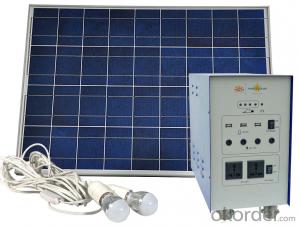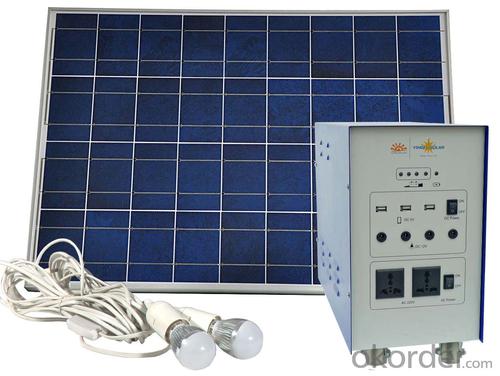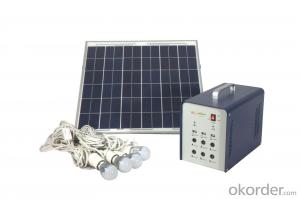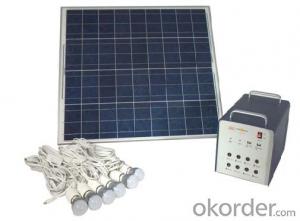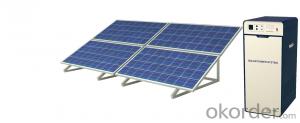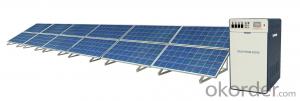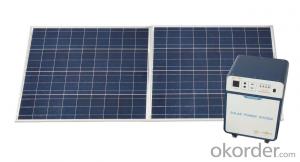Chennai Solar Energy Systems - Home Off-Grid Solar Power System DC Lighting JS-SPS-600C
- Loading Port:
- Tianjin
- Payment Terms:
- TT OR LC
- Min Order Qty:
- 10 set
- Supply Capability:
- 10000 set/month
OKorder Service Pledge
Quality Product, Order Online Tracking, Timely Delivery
OKorder Financial Service
Credit Rating, Credit Services, Credit Purchasing
You Might Also Like
Off-grid Solar Power System
General Introduction
Solar power system provides alternating current and direct current, which is produced by the modules transforming solar power into power, to home lighting, household appliance and other DC appliance, such as cell phone and laptop.
Solar power system is widely used in area lack of power, for example house power supplying, monitoring, communication base, fire prevention in forest area, pasture and meadow, aquaculture etc.
We are dedicated to provide high quality off-grid PV products and systems to customers and has received a series of certificate, including ISO9001, TUV, UL, CE, CQC and RoHS.
Solar DC Lighting System
Multiple protection system, safe and reliable performance.
Integrated and portable design, easy operation.
DC5V, DC12V, AC220V output, wide range application.
Clean engergy, cycle use.
General Introduction
Solar power system provides alternating current and direct current, which is produced by the modules transforming solar power into power, to home lighting, household appliance and other DC appliance, such as cell phone and laptop.
Solar power system is widely used in area lack of power, for example house power supplying, monitoring, communication base, fire prevention in forest area, pasture and meadow, aquaculture etc.
We are dedicated to provide high quality off-grid PV products and systems to customers and has received a series of certificate, including ISO9001, TUV, UL, CE, CQC and RoHS.
Solar DC Lighting System
Multiple protection system, safe and reliable performance.
Integrated and portable design, easy operation.
DC5V, DC12V, AC220V output, wide range application.
Clean engergy, cycle use.
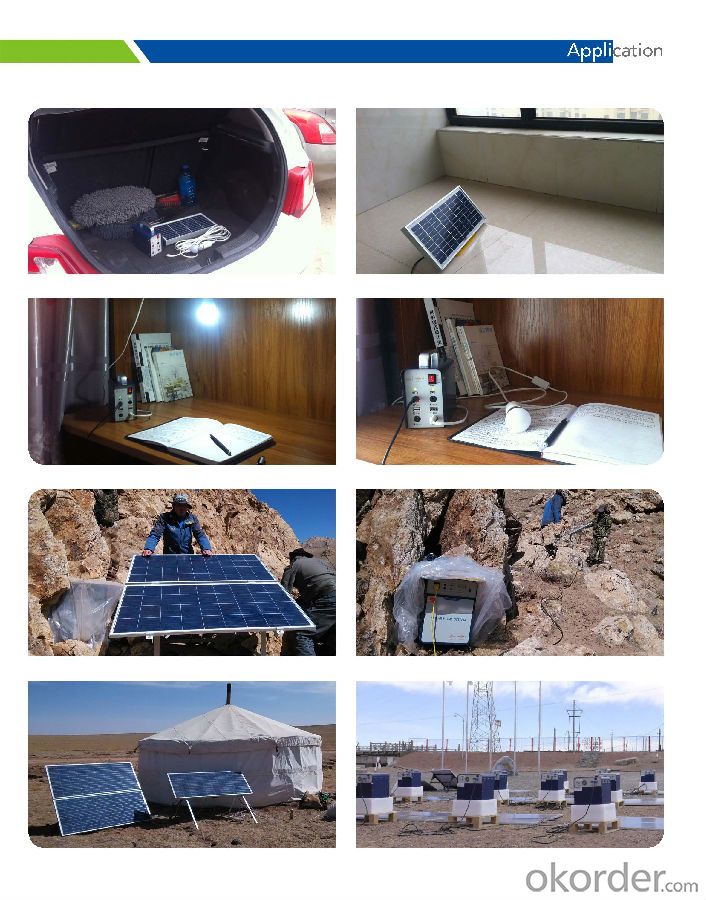
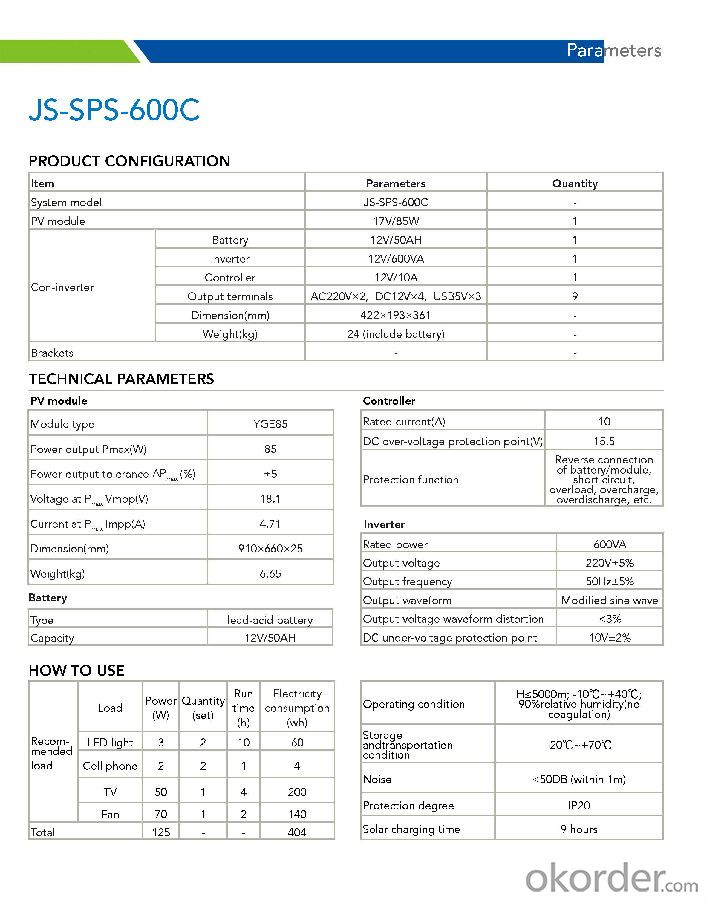
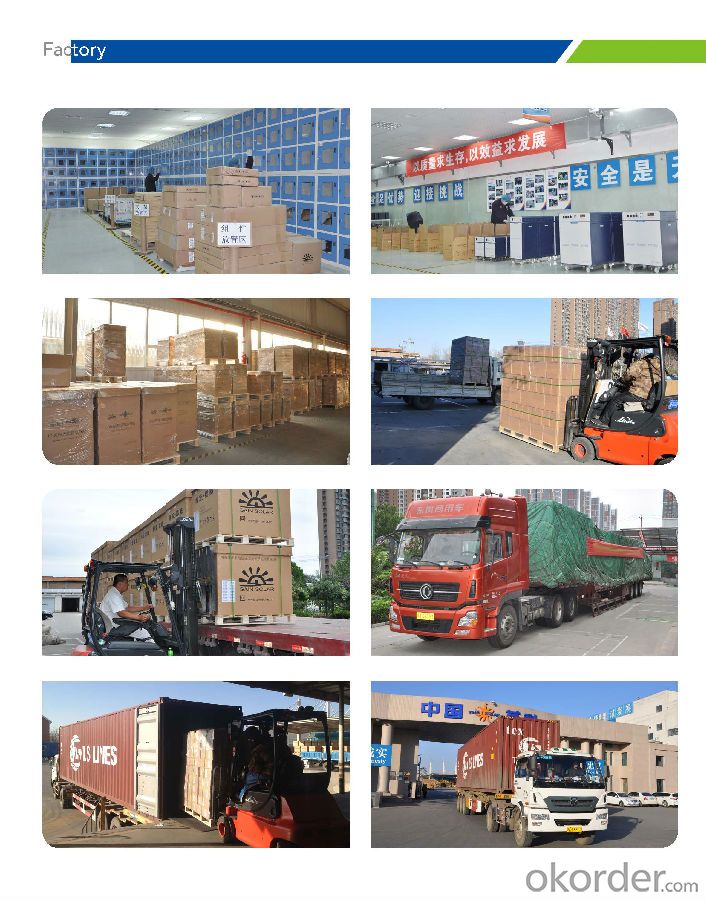
- Q: Can solar energy systems be used for powering agricultural irrigation systems?
- Yes, solar energy systems can indeed be used to power agricultural irrigation systems. Solar panels can generate electricity to power pumps and other equipment needed for irrigation. This allows farmers to harness renewable energy and reduce reliance on fossil fuels, making it an environmentally friendly and cost-effective solution for irrigation in remote areas.
- Q: What are the environmental benefits of using solar energy systems?
- There are several environmental benefits associated with using solar energy systems. Firstly, solar energy is a renewable source of energy, meaning it is constantly replenished by the sun and will never run out. This is in stark contrast to fossil fuels like coal or oil, which are finite resources and contribute to the depletion of our planet's natural resources. Another significant environmental benefit of solar energy is its minimal greenhouse gas emissions. When compared to traditional energy sources like coal or natural gas, solar energy systems produce significantly lower levels of carbon dioxide and other harmful pollutants. By reducing our reliance on fossil fuels and transitioning to solar power, we can mitigate the adverse effects of climate change and improve air quality. Furthermore, solar energy systems have a smaller ecological footprint compared to other forms of energy generation. The extraction and transportation of fossil fuels often leads to habitat destruction, soil erosion, and water pollution. On the other hand, solar panels have a relatively low impact on the environment during their manufacturing process, and they do not require ongoing extraction or transportation of fuel. Solar energy systems also offer the advantage of decentralization. Unlike large-scale power plants that rely on extensive transmission infrastructure, solar panels can be installed on rooftops, reducing the need for long-distance energy transportation. This not only decreases the energy loss during transmission but also helps to protect natural habitats from being disrupted by the construction of power lines. Finally, using solar energy systems can contribute to energy independence. By harnessing the power of the sun, individuals, communities, and even entire countries can reduce their reliance on imported energy resources. This reduces the vulnerability to price fluctuations and supply disruptions associated with fossil fuels, promoting energy security and stability. In conclusion, the environmental benefits of using solar energy systems are numerous and significant. From being a renewable source of energy and reducing greenhouse gas emissions to minimizing ecological footprints and promoting energy independence, solar power offers a sustainable and responsible alternative to traditional energy sources.
- Q: Can solar energy systems be used in cloudy or rainy climates?
- Yes, solar energy systems can still be used in cloudy or rainy climates. While the efficiency of solar panels may be reduced in such conditions, they can still generate electricity. Additionally, advancements in technology and the use of energy storage systems allow for the capture and utilization of solar energy even during periods of limited sunlight.
- Q: How do solar energy systems contribute to job creation?
- Solar energy systems contribute to job creation in several ways. Firstly, the installation and maintenance of solar panels require skilled labor, creating job opportunities for electricians, engineers, and technicians. Additionally, the manufacturing of solar panels and related equipment also generates employment in the renewable energy industry. Moreover, as solar energy becomes more popular and widespread, there is a growing need for sales, marketing, and customer service personnel to promote and support solar energy systems. Overall, the adoption of solar energy systems creates a ripple effect, stimulating economic growth and providing employment opportunities across various sectors.
- Q: How do solar energy systems impact water quality?
- Solar energy systems have a minimal impact on water quality. Unlike fossil fuel-based power generation, solar energy does not produce any harmful pollutants or emissions that can contaminate water sources. This makes solar energy systems a cleaner and more sustainable alternative, ensuring that water quality remains unaffected by their operation.
- Q: Can solar energy systems be used for greenhouse heating?
- Yes, solar energy systems can be used for greenhouse heating. Solar panels can be installed to convert sunlight into electricity, which can then be used to power heating systems within the greenhouse. Additionally, solar thermal systems can be used to directly heat water or air within the greenhouse. These systems provide a sustainable and cost-effective solution for greenhouse heating, reducing reliance on fossil fuels and minimizing environmental impact.
- Q: Can solar energy systems be used in space exploration?
- Yes, solar energy systems can be used in space exploration. In fact, solar panels are commonly used in spacecraft to generate electricity from the Sun's energy. These panels capture sunlight and convert it into electrical power, providing a reliable and sustainable source of energy for various applications in space missions. Solar energy systems are crucial for powering satellites, rovers, and even future manned missions, as they can operate efficiently and indefinitely in the space environment.
- Q: Can solar energy systems be used in powering wastewater treatment plants?
- Yes, solar energy systems can be used to power wastewater treatment plants. Solar panels can be installed to generate electricity, which can be used to power various components of the treatment plant such as pumps, blowers, and lighting. This renewable energy source reduces the reliance on traditional fossil fuels, lowers operating costs, and helps to reduce the carbon footprint of wastewater treatment facilities.
- Q: What is the payback period for installing a solar energy system?
- The payback period for installing a solar energy system can vary depending on various factors such as the initial cost of the system, the amount of energy it generates, and the cost of electricity in your area. However, on average, the payback period for a residential solar energy system is typically between 5 to 10 years. This means that it takes around 5 to 10 years for the savings on your electricity bills to equal the upfront cost of installing the system. After the payback period, you can enjoy free or significantly reduced electricity costs for the remaining lifespan of the system, which is typically around 25 to 30 years. It is important to note that government incentives, tax credits, and net metering programs can further reduce the payback period and increase the overall financial benefits of installing a solar energy system.
- Q: Can solar energy systems be used in areas with limited resources?
- Yes, solar energy systems can be used in areas with limited resources. Solar power is a renewable energy source that requires no fuel and can be harnessed using simple technologies. It can be particularly beneficial in areas with limited access to traditional energy sources, such as remote regions or developing countries. Solar energy systems can provide electricity for basic needs like lighting, cooking, and powering small appliances, improving the quality of life and promoting sustainable development in resource-constrained areas.
Send your message to us
Chennai Solar Energy Systems - Home Off-Grid Solar Power System DC Lighting JS-SPS-600C
- Loading Port:
- Tianjin
- Payment Terms:
- TT OR LC
- Min Order Qty:
- 10 set
- Supply Capability:
- 10000 set/month
OKorder Service Pledge
Quality Product, Order Online Tracking, Timely Delivery
OKorder Financial Service
Credit Rating, Credit Services, Credit Purchasing
Similar products
Hot products
Hot Searches
Related keywords
